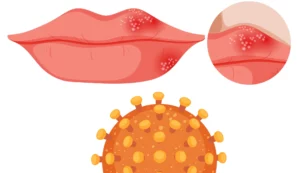 Cold sores, also known as oral herpes or fever blisters, are a common viral infection caused by the herpes simplex virus (HSV).
Cold sores, also known as oral herpes or fever blisters, are a common viral infection caused by the herpes simplex virus (HSV).
For some individuals, these sores can be recurrent, causing discomfort and embarrassment.
Today, we’ll explore recurrent cold sores, their triggers, and their management.
Understanding Cold Sores
Cold sores are small, fluid-filled blisters that typically appear on or around the lips. They are caused by the herpes simplex virus, with HSV-1 being the primary culprit. Recurrent cold sores occur when the virus reactivates after a period of dormancy.
Common Triggers
- Stress. Emotional or physical stress weakens the immune system, making it easier for the virus to reactivate.
- Sun Exposure. Prolonged sun exposure can trigger outbreaks, so using lip balm with SPF is recommended.
- Illness. A weakened immune system due to illnesses can lead to outbreaks.
- Menstruation. Some women experience cold sores before or during their menstrual cycle.
- Fever or Infections. Having a fever or another infection can provoke cold sores.
- Trauma. Lip injuries or dental work can trigger outbreaks in some cases.
Managing Recurrent Outbreaks
Although there’s no cure for cold sores, you can take steps to manage and reduce the frequency of recurrent outbreaks:
- Antiviral Medications. Prescription antiviral medications can help reduce the duration and severity of outbreaks.
- Topical Creams. Over-the-counter creams can provide relief from pain and itching.
- Avoiding Triggers. Identifying and avoiding personal triggers is essential.
- Good Hygiene. Practice good hygiene to prevent the virus from spreading to other areas or other people.
- Stress Management. Stress reduction techniques, such as meditation or deep breathing, can be helpful.
- Sun Protection. Use lip balm with SPF to protect against sun-induced outbreaks.
When to See a Healthcare Provider
If you experience frequent, severe, or prolonged outbreaks, or if you have other health concerns related to cold sores, consult a healthcare provider. They can provide guidance, prescribe antiviral medications, and address any underlying issues.
Preventing Transmission
Be cautious not to spread the virus to others. Avoid kissing, sharing utensils, or engaging in oral contact during an outbreak.
Living with Recurrent Cold Sores
Recurrent cold sores can be managed effectively with proper care and treatment. Remember that you’re not alone – millions of people worldwide experience these outbreaks, and healthcare providers can offer support and guidance.
Recurrent cold sores can be a source of discomfort and self-consciousness, but they can be managed. By identifying triggers, adopting good hygiene practices, and seeking medical advice when necessary, individuals can reduce the frequency and severity of outbreaks, ultimately improving their quality of life.
Picture Credit: Freepik
